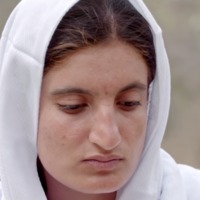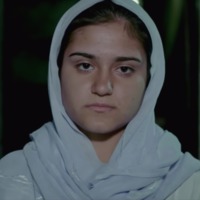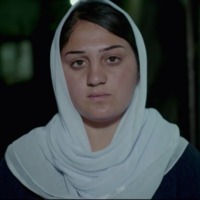
Nadia Murad (Narrative 2)
ISIS has singled out the Yazidi minority, notably its women and children, for particularly brutal treatment. In August 2014, ISIS fighters abducted hundreds, possibly thousands, of Yezidi men, women and children who were fleeing the IS takeover from the Sinjar region, in the north-west of the country. Hundreds of the men were killed and others were forced to convert to Islam under threat of death. Younger women and girls, some as young as 12, were separated from their parents and older relatives and sold, given as gifts or forced to marry ISIS fighters and supporters. Nadia was kidnapped by ISIS. when she was twenty-one years old. She was loaded on to a bus with other young women. Upon arrival in Mosul, the women were beaten, sold and forced to convert to Islam. She details how she feels about the complicity of ISIS women in the exploitation of Yazidis. After being passed from captor to captor, raped on a daily basis, and deprived of basic human comforts like food and companionship, Nadia managed to escape. She jumped over a wall, walked through the night, and knocked on the door of strangers who risked their lives hiding her until it was safe to get her to a refugee camp. From there, Nadia went to Germany.

Hanan and Wissam
ISIS has singled out the Yezidi minority, notably its women and children, for particularly brutal treatment. In August 2014, ISIS fighters abducted hundreds, possibly thousands, of Yezidi men, women and children who were fleeing the IS takeover from the Sinjar region, in the north-west of the country. Hundreds of the men were killed and others were forced to convert to Islam under threat of death. Younger women and girls, some as young as 12, were separated from their parents and older relatives and sold, given as gifts or forced to marry ISIS fighters and supporters. Hanan and her son Wissam were taken by ISIS soldiers and sold first to an Algerian man, and then to a Syrian man. At five years old Wissam was taught to speak Arabic, read the Koran and trained in combat. If Hanan tried to stop the indoctrination of her son, she was subjected to physical beatings and threats to take him away. They were finally able to escape when Hanan told fighters she was going to call her cousin but instead called her husband who paid for his wife and son’s freedom.

Vian
ISIS has singled out the Yezidi minority, notably its women and children, for particularly brutal treatment. In August 2014, ISIS fighters abducted hundreds, possibly thousands, of Yezidi men, women and children who were fleeing the IS takeover from the Sinjar region, in the north-west of the country. Hundreds of the men were killed and others were forced to convert to Islam under threat of death. Younger women and girls, some as young as 12, were separated from their parents and older relatives and sold, given as gifts or forced to marry ISIS fighters and supporters. Vian was 15 years old when kidnapped by ISIS in August 2014 and held for 4 months in Raqqa, Syria. Vian tells of the atrocities she witnessed against girls as young as 7 by ISIS men. One afternoon Vian ran away and was able to make it to Turkey where her Uncle picked her up and brought her home to her family.

Ariana
ISIS has singled out the Yezidi minority, notably its women and children, for particularly brutal treatment. In August 2014, ISIS fighters abducted hundreds, possibly thousands, of Yezidi men, women and children who were fleeing the IS takeover from the Sinjar region, in the north-west of the country. Hundreds of the men were killed and others were forced to convert to Islam under threat of death. Younger women and girls, some as young as 12, were separated from their parents and older relatives and sold, given as gifts or forced to marry ISIS fighters and supporters. Ariana was kidnapped by ISIS in August 2014 when they invaded her school, divided the girls up and sold them. Ariana was held in ISIS captivity for 9 months and sold five times to different men. She was finally able to escape when she convinced one of the men to sell her back to her family.

Madline
ISIS has singled out the Yezidi minority, notably its women and children, for particularly brutal treatment. In August 2014, ISIS fighters abducted hundreds, possibly thousands, of Yezidi men, women and children who were fleeing the IS takeover from the Sinjar region, in the north-west of the country. Hundreds of the men were killed and others were forced to convert to Islam under threat of death. Younger women and girls, some as young as 12, were separated from their parents and older relatives and sold, given as gifts or forced to marry ISIS fighters and supporters. Madline was 17 years old when she was kidnapped by ISIS in her hometown of Sinjar, Iraq in August 2014. She was held for 3 months before she and the other Yazidi women were able to escape.

Nadia Murad
ISIS has singled out the Yazidi minority, notably its women and children, for particularly brutal treatment. In August 2014, ISIS fighters abducted hundreds, possibly thousands, of Yezidi men, women and children who were fleeing the IS takeover from the Sinjar region, in the north-west of the country. Hundreds of the men were killed and others were forced to convert to Islam under threat of death. Younger women and girls, some as young as 12, were separated from their parents and older relatives and sold, given as gifts or forced to marry ISIS fighters and supporters. Nadia Murad lived in the Sinjar district of Kurdistan in northern Iraq. Her village, Kocho, was taken by ISIS in August 2014 and people were told to convert to Islam or die. When ISIS failed to convert the Yazidi villagers, they first took the men and executed them, they took young boys to train in combat and kidnapped women and girls and enslaved them in domestic and sexual slavery. Nadine was taken with other women and girls to Mosul where they were distributed among Daesh fighters. Nadine was raped daily, forced to read the Koran and pray. After one unsuccessful attempt, Nadia was able to escape with the help of a Muslim family that lived nearby. She made it to the border with Kurdistan and was then among 1000 Yazidi women taken to Germany for treatment for their trauma.

Perwin
There is an estimated 520,000 people in enslavement in the Arab States. Within the region, Syria, Iraq, and Yemen had both the highest prevalence of modern slavery and the highest absolute number of victims, accounting for 76 percent of the victims in the region. There is an estimated 174,000 people enslaved in Iraq (GSI 2018). In August 2014, IS invaded the province of Sinjar in Iraqi Kurdistan. Mostly Yezidis, a traditional religious community with ancient customs live there. Over 6,000 Yezidis were abducted. In early 2016 Sinjar was liberated by Kurdish Peshmergas. Many young women used by IS as slaves returned to their region.

Cemila
There is an estimated 520,000 people in enslavement in the Arab States. Within the region, Syria, Iraq, and Yemen had both the highest prevalence of modern slavery and the highest absolute number of victims, accounting for 76 percent of the victims in the region. There is an estimated 174,000 people enslaved in Iraq (GSI 2018). In August 2014, IS invaded the province of Sinjar in Iraqi Kurdistan. Mostly Yezidis, a traditional religious community with ancient customs live there. Over 6,000 Yezidis were abducted. In early 2016 Sinjar was liberated by Kurdish Peshmergas. Many young women used by IS as slaves returned to their region.

Ilham
There is an estimated 520,000 people enslaved in the Arab States. Within the region, Syria, Iraq, and Yemen had both the highest prevalence of modern slavery and the highest absolute number of victims, accounting for 76 percent of the victims in the region. There is an estimated 174,000 people enslaved in Iraq (GSI 2018). In August 2014, IS invaded the province of Sinjar in Iraqi Kurdistan. Mostly Yezidis, a traditional religious community with ancient customs live there. Over 6,000 Yezidis were abducted. In early 2016 Sinjar was liberated by Kurdish Peshmergas. Many young women used by IS as slaves returned to their region.

Rozina
The Yazidis are a Kurdish-speaking people who live principally in northern Iraq – where there are around 500,000-600,000. There are another 200,000 settled in other parts of the world. The Yazidis have faced extreme persecution and marginalization in their home communities within Iraq due to their religion and beliefs. Starting in August 2014, ISIS has continuously targeted Yazidis in Iraq and Syria in its campaign to “purify” the region: kidnapping, raping, and forcing girls and women into sexual slavery, and murdering men in mass killings. In 2015, news reports revealed the discovery of a mass grave believed to have remains from more than 70 Yazidi women from Kocho village, where “Rozina” is from.

Arwa
ISIS has singled out the Yezidi minority, notably its women and children, for particularly brutal treatment. In August 2014, ISIS fighters abducted hundreds, possibly thousands, of Yezidi men, women and children who were fleeing the IS takeover from the Sinjar region, in the north-west of the country. Hundreds of the men were killed and others were forced to convert to Islam under threat of death. Younger women and girls, some as young as 12, were separated from their parents and older relatives and sold, given as gifts or forced to marry ISIS fighters and supporters. Arwa was abducted in August 2014 in a village south of Mount Sinjar with scores of her relatives and hundreds of neighbours. She was held in ISIS captivity in various places in Syria and Iraq, where she was raped, before escaping. Sixty-two of her relatives, including her mother and siblings, are still in ISIS hands. She was 15 years old during her enslavement and when she told her story in late 2014.